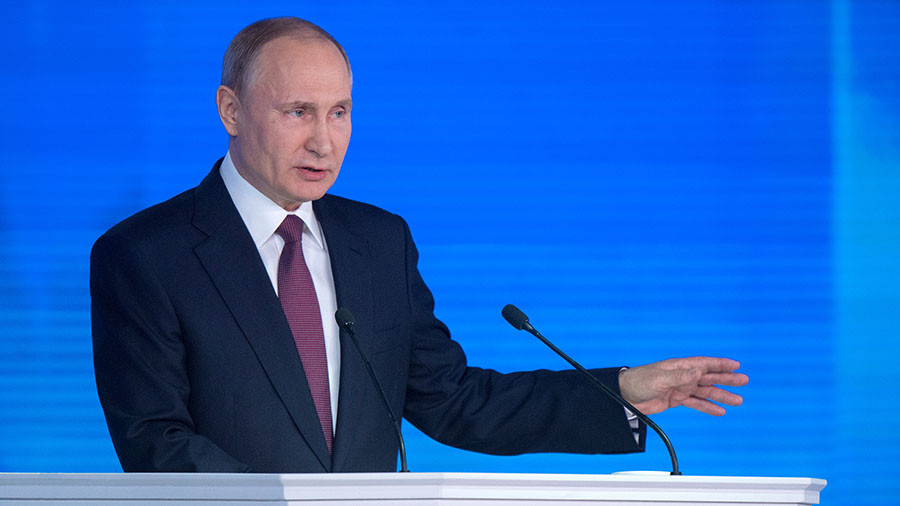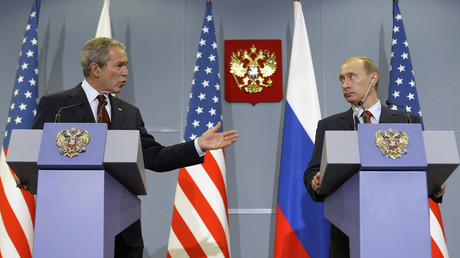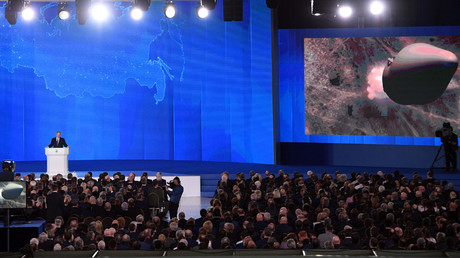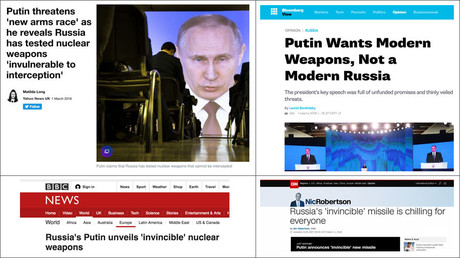US-Russia agenda now contains just one issue: the prevention of war
Bryan MacDonald is an Irish journalist based in Russia.

Vladimir Putin's postponed annual address ruffled many feathers as he delivered some home truths: Russia intends to follow its own developmental path and wants the West to back off from its frontiers and vital interests.
There may be two sides to every story. But it’s not often we see a pair of completely different interpretations of a single political speech. However, it happened on Thursday, as Putin announced his vision for the upcoming years of Russia’s development.
Predictably, Western media reacted hysterically to Putin’s boasts about Russia’s improved missile capability, while the domestic audience focused on the real meat: the Kremlin is about to embark upon a massive renewal project which will kickstart its economy and hopefully increase the quality of life across the vast country.
This is precisely what Putin wanted. And his message to external observers was very simple: the West must face up to the fact that it has failed to contain Russia and it can't defeat the country militarily. Thus, the president was basically saying “leave us alone or things will get worse.”
Home Truths
Because, truly, Russia just wants to worry about its own affairs now. The country urgently needs to modernize if it's to prosper going forward. To this end, Putin promised to extend nationwide the kind of improvements already seen in Kazan, Vladivostok and Sochi – which are cities boasting infrastructure comparable to leading Western urban centers. At the same time, Putin spoke of investing in special schools for gifted children, establishing cultural, educational and museum complexes in the regions and splashing out $200 billion to improve Russia’s much-maligned road network.
This is what Russian voters care about. But Putin also wanted to tell the West to yield, and his trolling was magisterial in both its construction and the frenzy it prompted. As surely anticipated, foreign observers who listened to the latter part of the address immediately rushed onto various media platforms to say Putin is launching a new “arms race.” Meaning, of course, that the West must re-arm (and waste lots of money) to counter Moscow. But these “experts” forget how Russia already has most of the weaponry it needs for its own objectives and it doesn’t have to hike up spending.
Which is why the Kremlin has sharply cut the military budget, in order to divert capital to social programs. You see, Putin has learned from the demise of the USSR and he understands how Russia’s military needs to be lean and efficient because the country can’t afford grandiose imperial ambitions.
Thus, it’s all a game. The US announces new missile system and nuclear modernization plans and expects Moscow to follow suit, and then becomes confused when the Russians don’t take the bait. Right now, Donald Trump wants to spend $1.2 trillion on the US nuclear arsenal: an amount equivalent to about 26 years of Russia’s entire defenseallocation. And, of course, this is $1.2 trillion the US could spend on schools, hospitals or real infrastructure but instead is lavishing on useless equipment that will never be used. So Putin has maneuvered the US into doing what the Soviets did, frittering away money on wasteful prestige projects while the social contract decays.
Boxing Clever
This is “rope-a-dope” stuff. The same strategy Muhammad Ali deployed against George Foreman in 1974’s “Rumble in the Jungle.” And here’s the proof: CNN’s third highest placed article on Friday morning (Moscow time) was an op-ed by Nic Robertson, its international diplomatic editor, titled “Russia’s 'invincible' missile is chilling for everyone.” The piece exposed Robertson as a man who clearly couldn’t see the wood from the trees if he were standing in a lumber yard. He described Putin as “preening himself, preparing his gullible masses to vote for him later this month.” But the real gullible ones are Robertson and his editors who fell for Putin’s smokescreen.
This writer wasn’t alone, naturally. Headlines such as “Russia has 'unstoppable' supersonic nuclear missile that cannot be traced by Western defence systems, says Putin” (The Independent),“Putin claims new 'invincible' missile can pierce US defenses” (CNN) and "Putin threatens US arms race with new missiles declaration” (Guardian) all served to raise panic levels. Meanwhile, Putin’s own Twitter account was telling Russians how he was about to invest in Russia’s roads. As David Filipov, an actual American Russia expert, tweeted:“One way to look at it is that a guy who intends to destroy the earth 17 times over probably leaves the dirt paths the way they are.”
The Russian president knows his country can’t overtake America (with well over two times the population and five times the economic strength). Because the US has been top dog for around a century now, while Russia is recovering from years of financial and social chaos following the collapse of Soviet communism. As a result, all the Kremlin needs to do is invest in enough of a deterrence so that the US understands it can’t directly attack Russia’s key interests. And this is sufficient.
Successful Trap
James Mattis recently confirmed how Putin’s plan is working, with the US defense secretary telling American politicians that Washington’s plan to develop nuclear-capable sea-launched cruise missiles was a bargaining chip against Russia. "I don't think the Russians would be willing to give up something to gain nothing from us,” he said. Words which were evidently noted in Moscow.
Amid graphics showing rockets heading towards the US mainland, Putin warned: “we tried to talk to our partners. Russia is a major nuclear power. They kept ignoring us. No one was talking to us. So listen to us now.” Yet, he also made it clear how the Russians wouldn’t start a conflict and emphasized that the military buildup was forced on Moscow by Western policies.
Meanwhile, when it came to juicy stuff Russian voters care about, Putin was making a number of pledges: he’d reduce the amount of Russians living under the poverty line by half and he’d make housing more affordable. And the president also spoke of investing in education, healthcare, infrastructure and environmental protection. But he further emphasized that Russia first needed to guarantee its security and sovereignty in order to realize these ambitions.
As the respected analyst Dmitri Trenin put it: “for the foreseeable future, it looks that the US-Russia agenda will be limited to just one item: war prevention.” And the former Soviet Army colonel is right: Putin realizes there is no short-term hope of detente with the Americans. Thus, he feels the best strategy is to spook them into leaving Russia alone and ceasing the eastward expansion of their NATO military alliance, which will allow Moscow to concentrate on domestic challenges.
The statements, views and opinions expressed in this column are solely those of the author and do not necessarily represent those of RT.




0 Comments:
Post a Comment
Subscribe to Post Comments [Atom]
<< Home